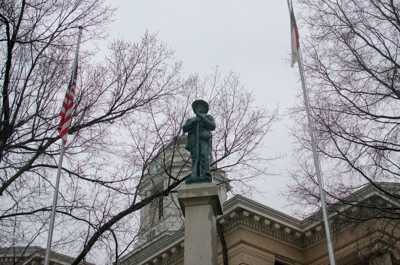East Carolina University’s Center for Survey Research (CSR) recently released the results of two separate surveys that contained information about controversies involving Confederate monuments on university campuses and sports gambling legalization.
On Wednesday, March 13, ECU News Services released a statement including the details of the two surveys’ findings. According to the press release, the CSR surveyed more than 700 adults in North Carolina on the topic of Confederate monuments and more than 1,000 adults over the age of 21 in Mississippi and New Jersey about Super Bowl betting.
“On the topic of sports gambling legalization, political party affiliation had little effect on the public’s feelings on the topic,” according to the ECU News Services statement. “On the other hand, the views related to Confederate monuments were sharply divided between those who voted for Donald Trump and those who voted for Hillary Clinton in the 2016 election.”
The survey regarding Super Bowl betting focused on public opinion from two states who have recently legalized sports gambling. The survey revealed both states were highly supportive of the legalization of sports gambling regardless of their regional and political differences, according to the press release.
Peter Francia, CSR director and political science professor at ECU, was involved in carrying out both surveys. In an interview, Francia said the CSR conducts surveys and polls about “pressing issues of the day.”
Francia said the CSR wants to survey topics the public is interested in, such as the legalization of sports gambling and Confederate monuments on college and university campuses. There were differences in the results of both polls involving political involvement.
In North Carolina, residents who were surveyed either electronically or via telephone were asked if they agreed or disagreed on whether Confederate monuments should be removed from college and university campuses within the state, Francia said. Residents could choose from five options ranging from strongly agree to strongly disagree.
“Twenty five percent of North Carolinians answered that they strongly agree those Confederate monuments should be removed from college and university campuses in North Carolina and 35 percent were in the strongly disagree category,” Francia said. “They were polar opposites.”
The survey results were broken down in a variety of different ways such as separating age demographics. Francia said based on the results, older voters were more likely to ask for the Confederate monuments to remain on college and university campuses whereas younger voters fell into the category of wanting them removed, Francia said.
Francia said the age gap separating people was not nearly as wide as the findings after dividing up residents who voted for Donald Trump or Hillary Clinton in the 2016 presidential election.
“When you break North Carolinians down that way (politically) we again see really strong opinions but in very opposite directions in terms of whether they agree or disagree on these questions concerning Confederate monuments,” Francia said.
Jonathan Morris, associate director of the CSR, said the center wanted to contribute to public knowledge by conducting scientific polling on the issues at hand.
Morris said the news and events which took place in North Carolina led to the CSR conducting a survey on Confederate monuments. Morris gave the example of the removal of Silent Sam on the University of North Carolina at Chapel Hill’s campus as one of the events leading to the survey.
“It’s quite possible that policy decisions are going to come from the state, the local level, and they already have come from the universities,” Morris said. “(The CSR) want to inform those decisions makers on what the public’s thinking and contribute to the debate and the decision-making process if possible, and also just so the public knows where they stand relative to each other.”
Sophomore communication major, Robert Smith, said he would feel uncomfortable if there were Confederate monuments present on ECU’s campus.
Smith said if the monuments were removed from campuses there would be less tension between races and a more inclusive environment.
“I don’t think it should be supported,” Smith said. “For example, I as a black American that goes to a PWI, predominantly white institution, I’m going to feel uncomfortable coming to a school that has Confederate monuments.”
Smith said his personal response to the topic is not based on politics, but rather age and race. According to Smith, because he is young, he does perceive the topic differently from other who are older.
Phillip Pilkington, a sophomore communication major, said Confederate monuments are a part of history and they should be recognized as something America overcame.
“It was part of a war and part of a rebellion against our union. However, we need to still support,” Pilkington said. “I mean those were people's views and even though we don’t agree with them nowadays, it still was a part of our country’s history and heritage.”
Pilkington said he would not feel uncomfortable if Confederate monuments were present on ECU’s campus because history should be remembered as it was. According to Pilkington, his beliefs are personal rather than politically driven.
“I am a conservative, so that’s going to be a little bit of it, and I was born in the south and I am a white male so that may be part of it, but I do think it’s a little more personal than political,” Pilkington said.







(0) comments
Welcome to the discussion.
Log In
Keep it Clean. Please avoid obscene, vulgar, lewd, racist or sexually-oriented language.
PLEASE TURN OFF YOUR CAPS LOCK.
Don't Threaten. Threats of harming another person will not be tolerated.
Be Truthful. Don't knowingly lie about anyone or anything.
Be Nice. No racism, sexism or any sort of -ism that is degrading to another person.
Be Proactive. Use the 'Report' link on each comment to let us know of abusive posts.
Share with Us. We'd love to hear eyewitness accounts, the history behind an article.